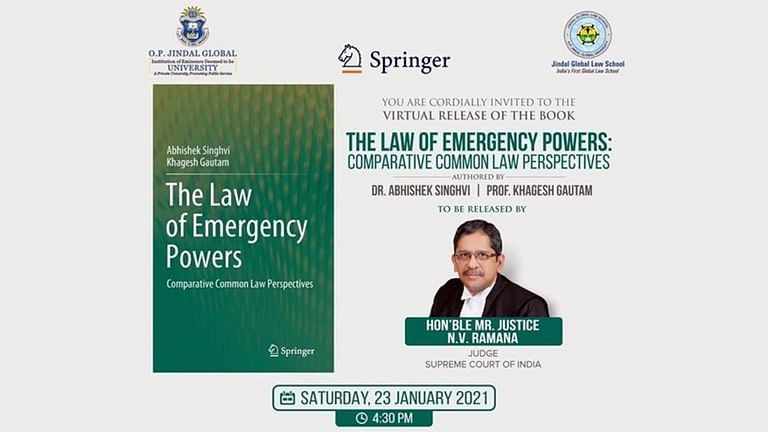New Delhi: Speaking at the launch of the book, The Law of Emergency Powers: Comparative Common Law Perspectives, authored by Dr Abhishek Singhvi, the senior-most judge of the Supreme Court, Justice N.V. Ramana revealed that his father was convinced he would be arrested after he presided over a public meeting on civil liberties during the nationwide Emergency in June 1975, and was asked to pack an extra pair of clothes. On hindsight, he felt that his father should have given him more money as he had to take a lorry and then walk all night to reach his maternal aunt’s house with only Rs 10 in his pocket.
Justice Ramana recounted his experience from the era which brought forth the importance of understanding the concept of emergency and learning about human tragedy, hunger, pain and suffering. Stating that emergencies have long lasting effects on generations, Justice Ramana said that though a year of his academic studies and mental suffering can be attributed to the Emergency, he has no regrets as he has seen so many young people sacrificing their lives for the sake of human rights.
Justice Chandrachud also spoke about days of the Emergency at the virtual launch of Singhvi’s book and said that his transformative years as a student were deeply impacted by the 21-month-long Emergency, from 1975 to 1977, as he was privy to the speeches delivered by eminent crusaders of personal liberty. As a young student he gained insight from the tribulations of his father, then judge, Justice Y.V. Chandrachud, and said that history was replete with instances of civil liberties being the collateral damage of a national emergency. Justice Chandrachud said that real law is developed in district courts and High Courts, pointing to the transfers of judges like Justice A.P. Sen, Justice Tulzapurkar and Justice Chinnappa Reddy because of their outstanding judgements during the Emergency.
Justice D.Y. Chandrachud opined that the timing of the release of the book was important as it came within a year of nationwide lockdowns by 13 countries to tackle the Covid-19 pandemic, where the Executive used exceptional powers. Justice Sanjay Kishan Kaul said he felt the need to improve legal education, as he believed India was churning out too many lawyers.
Justice Surya Kant said that the amount of delegation of powers to the Executive under TADA, POTA and UAPA to deal with terrorism was a matter of concern, as it left room for arbitrary exercise of powers that endangered individual liberty and human rights. While agreeing with the necessity for incorporation of such provisions to address the extraordinary situations, he stressed upon the need to prevent the abuse of these provisions through the Constitution.
Senior lawyer and author of the book, Dr A.M. Singhvi pointed out the glaring absence of genuine legal research in large parts of India because of the lack of quality control and the need to address the negative impact of stratification of law colleges. He pointed at the 2017 Madras High Court observation that 85% of law colleges needed to be closed to maintain sanctity of the legal profession.
Prof Khagesh Gautam, Associate Professor at O.P. Jindal Law School and one of the authors of the book, said, “I thank Dr A.M. Singhvi with whom I feel there must be a karmic bond—because the year his thesis was over, was the year I was born.”

